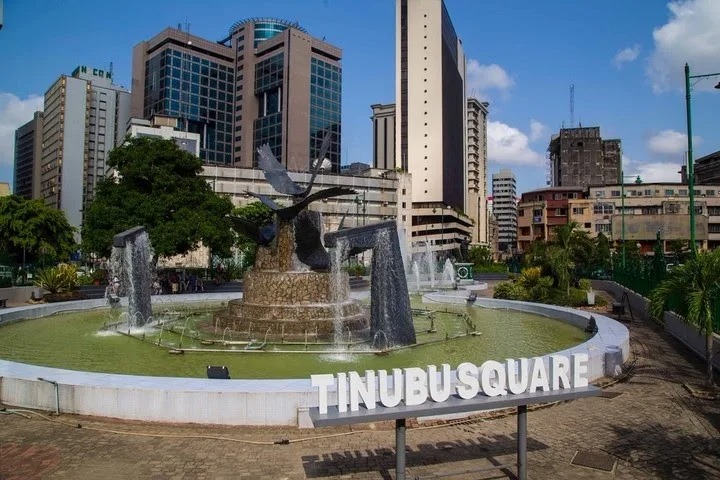Lagos, Nigeria’s vibrant commercial capital, is home to numerous landmarks that showcase the city’s rich history and cultural heritage. One such iconic landmark is Tinubu Square, a bustling hub of activity that seamlessly blends history, culture, and entertainment.
Located in the heart of Lagos, Tinubu Square is a popular tourist destination that attracts visitors from far and wide. The square is named after Madam Efunroye Tinubu, a prominent Lagosian businesswoman and leader who played a significant role in shaping the city’s development.
As you step into Tinubu Square, you are immediately struck by the vibrant atmosphere that pervades the area. The square is surrounded by colorful buildings, bustling markets, and street food vendors, creating a sensory experience that is quintessentially Lagos.
At the center of the square stands a majestic statue of Madam Tinubu, a testament to her enduring legacy. The statue is a popular spot for tourists to take photos, and it provides a poignant reminder of the important role that women have played in shaping Nigeria’s history.
Beyond its historical significance, Tinubu Square is also a hub of cultural activity. The square hosts numerous festivals and events throughout the year, showcasing the rich cultural heritage of Lagos. From traditional music and dance performances to art exhibitions and food festivals, there is always something happening at Tinubu Square.
For tourists, Tinubu Square offers a unique and unforgettable experience. The square is a melting pot of cultures, where visitors can experience the sights, sounds, and flavors of Lagos. From shopping for traditional crafts and souvenirs to sampling local cuisine and drinks, there are plenty of opportunities for tourists to engage with the local culture.
In addition to its cultural significance, Tinubu Square is also a great place to relax and unwind. The square is surrounded by several restaurants, bars, and cafes, offering a range of options for visitors to enjoy. Whether you’re looking for a quick snack or a leisurely meal, Tinubu Square has something for everyone.
Efunroye Tinubu Life and Influence
Madam Efunroye Tinubu was born around 1810 in Egbaland, a region in present-day Ogun State, Nigeria. She was a member of the Egba royal family and was known for her intelligence, business acumen, and strong will.
Tinubu’s early life was marked by her involvement in the slave trade, which was a dominant economic activity in West Africa during the 19th century. She was a successful trader who dealt in slaves, tobacco, salt, and other goods. Her business activities took her to various parts of West Africa, including Lagos, which was then a small but strategic trading post.
Rise to prominence in Lagos
Tinubu’s arrival in Lagos in the 1830s marked the beginning of her rise to prominence in the city. She quickly established herself as a successful trader and businesswoman, and her influence extended beyond the business community to the political and social spheres.
Tinubu’s relationships with the Obas (monarchs) of Lagos were particularly significant. She was a close friend and advisor to Oba Akintoye, who ruled Lagos from 1845 to 1851. Her influence with the Oba helped her to secure favorable trading conditions and to expand her business interests.
Conflict with British Colonial Authorities
Tinubu’s success and influence in Lagos eventually attracted the attention of British colonial authorities. The British had established a presence in Lagos in the mid-19th century, and they were keen to exert their control over the city’s trade and commerce.
Tinubu’s refusal to cooperate with the British authorities led to a series of conflicts between her and the colonial administration. In 1856, she was forced to flee Lagos after a dispute with the British consul, Benjamin Campbell. She returned to Lagos in 1860, but her relationships with the British authorities remained tense.
Legacy and Commemoration
Despite the controversies surrounding her life, Madam Tinubu remains an important figure in Nigerian history. Her business acumen, her influence in Lagos, and her refusal to cooperate with British colonial authorities have made her a legendary figure in Nigerian folklore.
Tinubu Square in Lagos is a testament to her enduring legacy. The square, which was originally known as Independence Square, was renamed in her honor in 1975. A statue of Tinubu stands in the square, and it has become a popular spot for tourists and locals alike.
Overall, Madam Efunroye Tinubu’s life and legacy serve as a reminder of the complex and often contentious history of Lagos and Nigeria. Her story highlights the agency and influence of African women in the 19th century, and it underscores the importance of preserving and celebrating Nigeria’s rich cultural heritage.
Tinubu Square is a significant tourist destination in Lagos, Nigeria, offering a unique blend of history, culture, and entertainment. Here are some of the significance of Tinubu Square to tourists:
Historical Significance: Tinubu Square is a historic site that commemorates the life and legacy of Madam Efunroye Tinubu, a prominent Lagosian businesswoman and leader. Tourists can learn about the history of Lagos and the role of Madam Tinubu in shaping the city’s development.
Cultural Experience: Tinubu Square offers tourists a glimpse into the rich cultural heritage of Lagos. The square is surrounded by traditional Nigerian architecture, and tourists can experience the sights, sounds, and flavors of Nigerian culture.
Statue of Madam Tinubu: The square features a statue of Madam Tinubu, which is a popular spot for tourists to take photos. The statue is a symbol of the city’s appreciation for Madam Tinubu’s contributions to its development.
Shopping and Dining: Tinubu Square is surrounded by shops, restaurants, and bars, offering tourists a range of shopping and dining options. Tourists can purchase traditional Nigerian crafts, clothing, and souvenirs, and enjoy local cuisine and drinks.
Nightlife: Tinubu Square is a popular spot for nightlife, with several bars and clubs in the area. Tourists can enjoy live music, dancing, and other forms of entertainment in a vibrant and lively atmosphere.
Accessibility: Tinubu Square is located in the heart of Lagos, making it easily accessible by car, taxi, or public transportation. Tourists can also walk to the square from nearby hotels and attractions.
Educational Value: Tinubu Square offers tourists an opportunity to learn about the history and culture of Lagos. The square is a popular spot for school groups and educational tours, and tourists can also learn about the significance of the square and the life of Madam Tinubu.
Photography: Tinubu Square is a photographer’s paradise, with its colorful buildings, vibrant street life, and historic landmarks. Tourists can take stunning photos of the square, the statue of Madam Tinubu, and the surrounding architecture.
Community Engagement: Tinubu Square is a hub of community activity, with locals gathering to socialize, shop, and dine. Tourists can engage with the local community, learn about their customs and traditions, and experience the warm hospitality of the Nigerian people.
Iconic Landmark: Tinubu Square is an iconic landmark in Lagos, and a visit to the square is a must-do for any tourist visiting the city. The square is a symbol of Lagos’ rich history and cultural heritage, and it offers tourists a unique and unforgettable experience.













